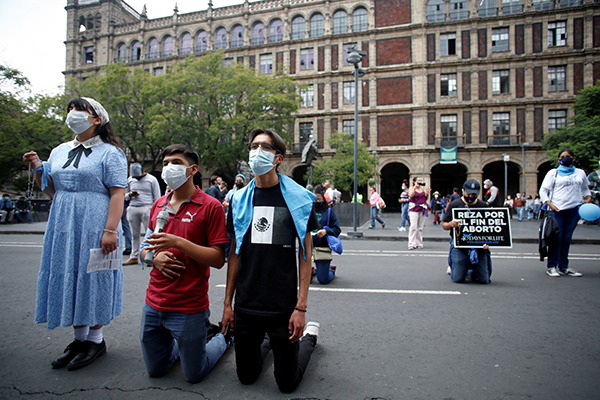
WINDSOR TERRACE — When Bishop James Tamayo held his priest council meeting on Sept. 8, he asked his priests — many of whom are Mexican nationals — if they had heard the news of the Mexican supreme court vote the day before that essentially legalized abortion in the country.
“Each one shook their head in disbelief, in sorrow, in regret, because it goes against everything we value and we were brought up with and a tenet of our faith,” said Bishop Tamayo, of the Texas-Mexico borderlands Diocese of Laredo.
[Related: Mexican Bishops Express Sorrow After Supreme Court Decriminalizes Abortion]
On Sept. 7, Mexico’s high court unanimously struck down a law in the northern state of Coahuila that set prison penalties of up to three years for having an abortion, finding that any criminalization of abortion violated the nation’s constitution.
The decision doesn’t automatically make abortion legal across Mexico, but it establishes a binding precedent for all judges in the country to follow.
That decision was followed by another from the Mexican supreme court on Sept. 9, which invalidated a portion of the constitution in the state of Sinaloa that had protected the right to life at the moment of conception.
That ruling has implications for other Mexican states with laws using similar language.
Both decisions drew swift reactions from both sides. A growing feminist-progressive movement in the country applauded the rulings. Meanwhile, Mexico’s Catholic bishops called for all social actors to “engage in a new and profound reflection that will allow us to find a common path to a solution” in a Sept. 8 statement on the first ruling. They hadn’t commented on the second ruling as of the end of the day on Sept. 10.
Mexico has one of the largest Catholic populations in the world.
And even though the decision doesn’t affect U.S. abortion laws — Texas recently passed the most restrictive abortion law in the country prohibiting the procedure as early as six weeks into a pregnancy — U.S. bishops on the border were equally as troubled by the rulings, given their closeness to many people south of the border.
Bishop Tamayo noted that “there is no border” between the people of the U.S. and Latin America when it comes to faith, and he called Mexico’s supreme court decision a “slap in the face” to the nation’s Catholic and Christian population.
“Life is the core of the society, of each family; it is a value we’ve held dear for centuries among our border communities and families, so there is a sadness, as I know that sadness is in Mexico,” Bishop Tamayo said.
“I am united with all of the bishops of Mexico and with all of the people of goodwill and faith that value life from the moment of conception to natural death, and with them pray and will work hard to share the message that life is a gift given to us by God,” he added.
Bishop Mark Seitz of El Paso also felt the weight of the decision.
“What happens on one side of the border reverberates on both sides,” Bishop Seitz said in a statement. “The decision of the Mexican Supreme Court that clears the way for the legalization of abortion in Mexico marks a sad retreat from the longstanding commitment rooted in Mexican culture and faith.”
The statement from Mexico’s bishops, responding to the first court ruling and calling for a renewed dialogue on the topic, criticized the decision in detail. They stated that while a mother’s heart suffers deeply when her children are hurt, the mother who witnesses death also goes through immense grief.
“With this sentiment, we deeply regret that, in the face of the apparent dilemma of not criminalizing the woman who aborts and preserving the life of the unborn child, the court has chosen to discard the latter, without seeking to safeguard both,” according to the statement. It was signed by Bishop Rogelio Cabrera Lopez, president of the Episcopal Conference of Mexico; Bishop Alfonso Gerardo Miranda Guardiola, secretary general of the conference; and Bishop Jesús José Herrara, responsible for the Episcopal Dimension of Life for the conference.
The bishops further wrote that, in the coming days and weeks, those overseeing the Episcopal Dimension of Life will offer technical criteria to help construct new proposals and actions. They concluded by asking the Blessed Virgin of Guadalupe to Intercede “in defense of women and the rights of the unborn.”
Bishop Tamayo noted the way Hispanics and Catholics in America cherish Our Lady of Guadalupe. He said the image where she has a maternity band on her waist is a constant reminder and a model for all Catholics.
“Remember, she valued her son. She brought him to birth, and, because he lived, he gave his life so we might live,” Bishop Tamayo said. “May she intercede for us.”
